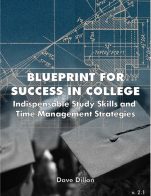
Access these videos and more from LinkedIn Learning (HUB.rrc.ca).

This box contains Open Textbooks. Check out the Library's OER page for more information.
 Blueprint for Success in College: Indispensable Study Skills and Time Management Strategies
by
Grossmont College
Blueprint for Success in College: Indispensable Study Skills and Time Management Strategies
by
Grossmont College
There’s no doubt about it, starting college will place extra demands on your time. The math is simple! Think about it - you have 168 hours in a week and need to budget sleep, eating, transportation, classes, work, and recreation. In the time remaining , you will have to make some decisions about managing your time since you may need 8 to 10 hours per week of study time for each subject you’re enrolled in.
When deciding how to allocate your precious time, consider the tips and tricks found below. And remember, there’s always help if you need it – connect with an Academic Coach to learn more about how you can master the art of time management.
Want to have more time at the end of your studies instead of more studies when you’ve run out of time? Check out these quick tips.
Make Friends with an Organizer! Whether it's a physical calendar, a calendar on your phone, or another type of calendar or day planner, find something that works best for you.
And remember, we’re always here to help. Connect with an Academic Coach today for more time management tips!
Use the tip sheets below to apply the information learned in this section.